C++20: Optimized Comparison with the Spaceship Operator
In this post, I conclude my miniseries on the three-way comparison operator with a few subtle details. The subtle details include the compiler-generated == and != operators and the interplay of classical comparison operators, and the three-way comparison operator.
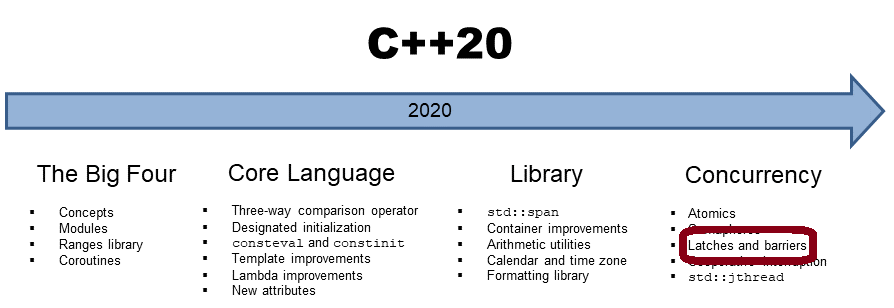
I finished my last post, “C++20: More Details to the Spaceship Operator” with the following class MyInt. In this concrete case, I promised to elaborate more on the difference between an explicit and a non-explicit constructor. The rule of thumb is that a constructor taking one argument should be explicit.
Explicit Constructor
Here is essentially the user-defined type MyInt from my last post.
// threeWayComparisonWithInt2.cpp #include <compare> #include <iostream> class MyInt { public: constexpr explicit MyInt(int val): value{val} { } // (1) auto operator<=>(const MyInt& rhs) const = default; // (2) constexpr auto operator<=>(const int& rhs) const { // (3) return value <=> rhs; } private: int value; }; int main() { std::cout << std::boolalpha << std::endl; constexpr MyInt myInt2011(2011); constexpr MyInt myInt2014(2014); std::cout << "myInt2011 < myInt2014: " << (myInt2011 < myInt2014) << std::endl; // (4) std::cout << "myInt2011 < 2014: " << (myInt2011 < 2014) << std::endl; // (5) std::cout << "myInt2011 < 2014.5: " << (myInt2011 < 2014.5) << std::endl; // (6) std::cout << "myInt2011 < true: " << (myInt2011 < true) << std::endl; // (7) std::cout << std::endl; }
Constructors taking one argument such as (1) are often called conversion constructors because they can generate, such as in this case an instance of MyInt from an int.
MyInt has an explicit constructor (1), a compiler-generated three-way comparison operator (2), and a user-defined comparison operator for int(3). (4) uses the compiler-generated comparison operator for MyInt, and (5, 6, and 7) the user-defined comparison operator for int. Thanks to implicit narrowing to int (6) and the integral promotion (7), instances of MyInt can be compared with double values and bool values.
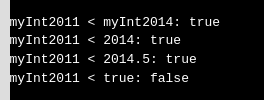
When I make MyInt more int-like, the benefit of the explicit constructor (1) becomes apparent. In the following example, MyInt supports basic arithmetic.

 Modernes C++ Mentoring
Modernes C++ Mentoring
Do you want to stay informed: Subscribe.
// threeWayComparisonWithInt4.cpp #include <compare> #include <iostream> class MyInt { public: constexpr explicit MyInt(int val): value{val} { } // (3) auto operator<=>(const MyInt& rhs) const = default; constexpr auto operator<=>(const int& rhs) const { return value <=> rhs; } constexpr friend MyInt operator+(const MyInt& a, const MyInt& b){ return MyInt(a.value + b.value); } constexpr friend MyInt operator-(const MyInt& a,const MyInt& b){ return MyInt(a.value - b.value); } constexpr friend MyInt operator*(const MyInt& a, const MyInt& b){ return MyInt(a.value * b.value); } constexpr friend MyInt operator/(const MyInt& a, const MyInt& b){ return MyInt(a.value / b.value); } friend std::ostream& operator<< (std::ostream &out, const MyInt& myInt){ out << myInt.value; return out; } private: int value; }; int main() { std::cout << std::boolalpha << std::endl; constexpr MyInt myInt2011(2011); constexpr MyInt myInt2014(2014); std::cout << "myInt2011 < myInt2014: " << (myInt2011 < myInt2014) << std::endl; std::cout << "myInt2011 < 2014: " << (myInt2011 < 2014) << std::endl; std::cout << "myInt2011 < 2014.5: " << (myInt2011 < 2014.5) << std::endl; std::cout << "myInt2011 < true: " << (myInt2011 < true) << std::endl; constexpr MyInt res1 = (myInt2014 - myInt2011) * myInt2011; // (1) std::cout << "res1: " << res1 << std::endl; constexpr MyInt res2 = (myInt2014 - myInt2011) * 2011; // (2) std::cout << "res2: " << res2 << std::endl; constexpr MyInt res3 = (false + myInt2011 + 0.5) / true; // (3) std::cout << "res3: " << res3 << std::endl; std::cout << std::endl; }
MyInt supports basic arithmetic with objects of type MyInt (1) but not basic arithmetic with built-in types such as int (2), double, or bool (3). The error message of the compiler gives an unambiguous message:

The compiler knows in (2) no conversion from int to const MyInt and in (3) no conversion form from bool to const MyInt. A viable way to make an int, double, or bool to const MyInt is a non-explicit constructor. Consequently, when I remove the explicit keyword from the constructor (1), the implicit conversion kicks in, and the program compiles and produces the surprising result.
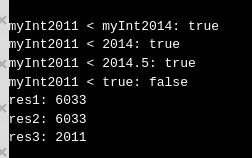
The compiler-generated == and != operators are special for performance reasons.
Optimized == and != operators
I wrote in my first post, “C++20: The Three-Way Comparison Operator“, that the compiler-generated comparison operators apply lexicographical comparison. Lexicographical comparison means that all base classes are compared left to right and all non-static members in their declaration order.
Andrew Koenig wrote a comment to my post “C++20: More Details to the Spaceship Operator” on the Facebook group C++ Enthusiast, which I want to quote here:
There’s a potential performance problem with <=> that might be worth mentioning: for some types, it is often possible to implement == and != in a way that potentially runs much faster than <=>.
For example, for a vectorlike or stringlike class, == and != can stop after determining that the two values being compared have different lengths, whereas <=> has to examine elements until it finds a difference. If one value is a prefix of the other, that makes the difference between O(1) and O(n).
I have nothing to add to Andrew’s comment but one observation. The standardization committee was aware of this performance issue and fixed it with the paper P1185R2. Consequently, the compiler-generated == and != operators compare in the case of a string or a vector first their length and then their content if necessary.
User-defined and auto-generated Comparison Operators
When you can define one of the six comparison operators and auto-generate all of them using the spaceship operator, there is one question: Which one has the higher priority? For example, my new implementation MyInt has a user-defined smaller and identity operator, and the compiler-generated six comparison operators.
Let me see what happens:
// threeWayComparisonWithInt5.cpp #include <compare> #include <iostream> class MyInt { public: constexpr explicit MyInt(int val): value{val} { } bool operator == (const MyInt& rhs) const { std::cout << "== " << std::endl; return value == rhs.value; } bool operator < (const MyInt& rhs) const { std::cout << "< " << std::endl; return value < rhs.value; } auto operator<=>(const MyInt& rhs) const = default; private: int value; }; int main() { MyInt myInt2011(2011); MyInt myInt2014(2014); myInt2011 == myInt2014; myInt2011 != myInt2014; myInt2011 < myInt2014; myInt2011 <= myInt2014; myInt2011 > myInt2014; myInt2011 >= myInt2014; }
To see the user-defined == and < operators in action, I write a corresponding message to std::cout. Both operators cannot be constexpr because std::cout is a run-time operation.
The compiler uses the user-defined == and < operators in this case. Additionally, the compiler synthesizes the != operator out of the == operator. The compiler does not synthesize the == operator out of the other.
This behavior does not surprise me because C++ behaves similarly to Python. In Python 3, the compiler generates != out of == if necessary but not the other way around. In Python 2, the so-called rich comparison (the user-defined six comparison operators) has higher priority than Python’s three-way comparison operator __cmp__. I have to say Python 2 because the three-way comparison operator is removed in Python 3.
What’s next?
Designated initialization is a particular case of aggregate initialization and empowers you to initialize the members of a class using their names directly. Designed initializers are my next C++20 topic.
Thanks a lot to my Patreon Supporters: Matt Braun, Roman Postanciuc, Tobias Zindl, G Prvulovic, Reinhold Dröge, Abernitzke, Frank Grimm, Sakib, Broeserl, António Pina, Sergey Agafyin, Андрей Бурмистров, Jake, GS, Lawton Shoemake, Jozo Leko, John Breland, Venkat Nandam, Jose Francisco, Douglas Tinkham, Kuchlong Kuchlong, Robert Blanch, Truels Wissneth, Mario Luoni, Friedrich Huber, lennonli, Pramod Tikare Muralidhara, Peter Ware, Daniel Hufschläger, Alessandro Pezzato, Bob Perry, Satish Vangipuram, Andi Ireland, Richard Ohnemus, Michael Dunsky, Leo Goodstadt, John Wiederhirn, Yacob Cohen-Arazi, Florian Tischler, Robin Furness, Michael Young, Holger Detering, Bernd Mühlhaus, Stephen Kelley, Kyle Dean, Tusar Palauri, Juan Dent, George Liao, Daniel Ceperley, Jon T Hess, Stephen Totten, Wolfgang Fütterer, Matthias Grün, Phillip Diekmann, Ben Atakora, Ann Shatoff, Rob North, Bhavith C Achar, Marco Parri Empoli, Philipp Lenk, Charles-Jianye Chen, Keith Jeffery, Matt Godbolt, and Honey Sukesan.
Thanks, in particular, to Jon Hess, Lakshman, Christian Wittenhorst, Sherhy Pyton, Dendi Suhubdy, Sudhakar Belagurusamy, Richard Sargeant, Rusty Fleming, John Nebel, Mipko, Alicja Kaminska, Slavko Radman, and David Poole.
| My special thanks to Embarcadero |  |
| My special thanks to PVS-Studio |  |
| My special thanks to Tipi.build |  |
| My special thanks to Take Up Code |  |
| My special thanks to SHAVEDYAKS |  |
Modernes C++ GmbH
Modernes C++ Mentoring (English)
Rainer Grimm
Yalovastraße 20
72108 Rottenburg
Mail: schulung@ModernesCpp.de
Mentoring: www.ModernesCpp.org
Modernes C++ Mentoring,


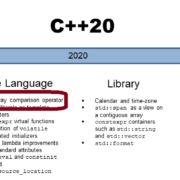
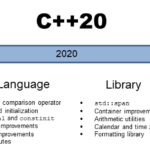
Leave a Reply
Want to join the discussion?Feel free to contribute!